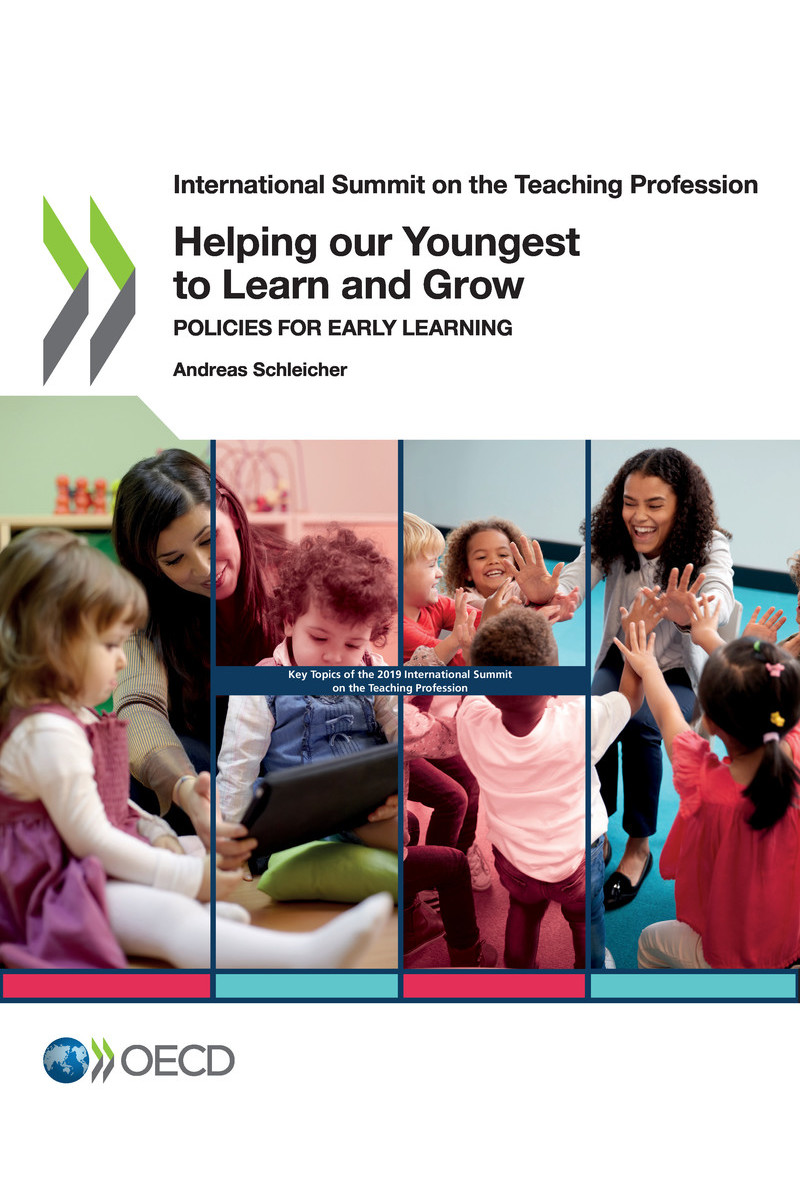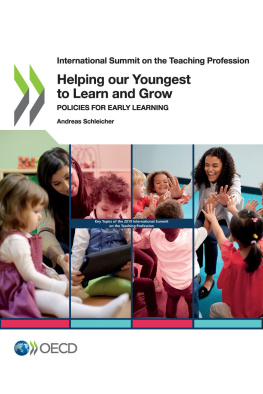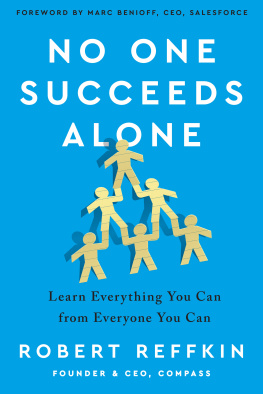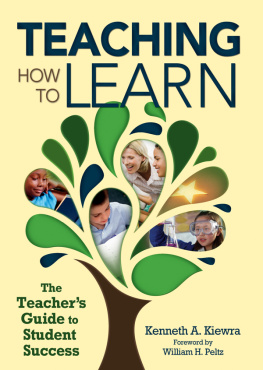Schleicher - Helping our Youngest to Learn and Grow
Here you can read online Schleicher - Helping our Youngest to Learn and Grow full text of the book (entire story) in english for free. Download pdf and epub, get meaning, cover and reviews about this ebook. year: 2019, publisher: OECD Publishing, genre: Children. Description of the work, (preface) as well as reviews are available. Best literature library LitArk.com created for fans of good reading and offers a wide selection of genres:
Romance novel
Science fiction
Adventure
Detective
Science
History
Home and family
Prose
Art
Politics
Computer
Non-fiction
Religion
Business
Children
Humor
Choose a favorite category and find really read worthwhile books. Enjoy immersion in the world of imagination, feel the emotions of the characters or learn something new for yourself, make an fascinating discovery.
- Book:Helping our Youngest to Learn and Grow
- Author:Schleicher / A
- Publisher:OECD Publishing
- Genre:
- Year:2019
- Rating:4 / 5
- Favourites:Add to favourites
- Your mark:
- 80
- 1
- 2
- 3
- 4
- 5
Helping our Youngest to Learn and Grow: summary, description and annotation
We offer to read an annotation, description, summary or preface (depends on what the author of the book "Helping our Youngest to Learn and Grow" wrote himself). If you haven't found the necessary information about the book — write in the comments, we will try to find it.
Helping our Youngest to Learn and Grow — read online for free the complete book (whole text) full work
Below is the text of the book, divided by pages. System saving the place of the last page read, allows you to conveniently read the book "Helping our Youngest to Learn and Grow" online for free, without having to search again every time where you left off. Put a bookmark, and you can go to the page where you finished reading at any time.
Font size:
Interval:
Bookmark:

Schleicher, A. (2019), Helping our Youngest to Learn and Grow: Policies for Early Learning , International Summit on the Teaching Profession, OECD Publishing, Paris.
https://doi.org/10.1787/9789264313873-en

In March 2019, the Finnish Ministry of Education, the OECD, and Education International brought education ministers, union leaders and other teacher leaders together for the International Summit on the Teaching Profession with the aim to better support the teaching profession in meeting the formidable challenges of 21st-century education.
One of the secrets of the success of the International Summit on the Teaching Profession is that it explores difficult and controversial issues on the basis of sound evidence, provided by the OECD as the global leader for internationally comparative data and analysis. For the first time, the Summit focused on early childhood education and care. This report summarises evidence that can underpin the discussion of this topic.
The first five years of a childs life are critical to his or her development. During this period, children learn at a faster rate than at any other time in their lives, developing cognitive, and social and emotional skills that are fundamental to their achievements throughout childhood and as adults. The rapid pace of development in early childhood means that investing in young children, both through their families and through access to high-quality early childhood education and care, leads to strong personal, social and economic returns. Effective early learning also predicts positive well-being across a range of indicators in adulthood, including general well-being, physical and mental health, educational attainment and employment. Disadvantaged children benefit from quality early childhood education and care the most, so investing in early childhood education and care and improving the quality of the environment for early development and learning could boost social mobility and inclusive growth.
While most countries have clearly articulated curricula and well-established pedagogical approaches when it comes to primary and upper secondary education, there is much less agreement among and within countries on how best to build strong foundations in early childhood education and care in order to shift the emphasis from access to quality, and from care to quality education. There is also much debate over age-appropriate pedagogies and the right balance in the development of cognitive, and social and emotional competencies. Often the provision of early childhood education and care is highly fragmented within education systems.
All of this has major implications for the initial and continued professional development of staff, and for the work organisation and governance of early childhood education and care.
Following an introductory chapter on policy challenges facing early childhood education and care, the second chapter of this report examines structural and process quality in early childhood education and care, issues that are closely related to policy design and implementation, and to dialogue between government and the profession. The third chapter then turns to what happens inside early childhood institutions with a review of pedagogical practice and the policies that can shape it. Both of these chapters are based on the OECD Starting Strong projects and related publications (main authors: Clara Barata, Eric Charbonnier, Arno Engel, Victoria Liberatore, Ineke Litjens, Elizabeth Shuey, Megan Sim, Miho Taguma and Stephanie Wall) and on findings from the PISA 2015 assessment (main authors: Francesco Avvisati, Alfonso Echazarra, Carlos Gonzles-Sancho and Mario Piacentini).
One of the topics that policy makers, educators and parents struggle most with these days concerns understanding the merits and demerits of introducing technology to foster childrens development. The rise in the amount of time children spend in front of screens has led to concerns about the consequences of technology use, and how it may affect childrens brains and their socio-emotional, cognitive and physical development. The fourth chapter explores the interplay between technology and learning, and summarises some of the literature on the effects of technology use on children, based on a working paper prepared by Francesca Gottschalk. A final section on the role of schools and policy in safe Internet use is drawn from a working paper prepared by Julie Hooft Graafland.
The report was prepared by Andreas Schleicher with input from Yuri Belfali and Karine Tremblay, and with support from Marilyn Achiron.

Andreas Schleicher
Director for Education and Skills and Special Advisor on Education Policy to the Secretary-General

Research has shown that attendance at early childhood education and care programmes can have a significant impact on childrens cognitive, social and emotional development, and on their performance in school and in life later on. There is evidence from both randomised controlled trials and observational studies that early childhood education and care has the potential to improve the life chances of children from disadvantaged families; yet results from PISA show that advantaged children are more likely to attend, and to attend for longer periods of time. Failing to tackle this situation could mean that early childhood education and care continue to exacerbate rather than mitigate inequities in education and in society.
Font size:
Interval:
Bookmark:
Similar books «Helping our Youngest to Learn and Grow»
Look at similar books to Helping our Youngest to Learn and Grow. We have selected literature similar in name and meaning in the hope of providing readers with more options to find new, interesting, not yet read works.
Discussion, reviews of the book Helping our Youngest to Learn and Grow and just readers' own opinions. Leave your comments, write what you think about the work, its meaning or the main characters. Specify what exactly you liked and what you didn't like, and why you think so.







